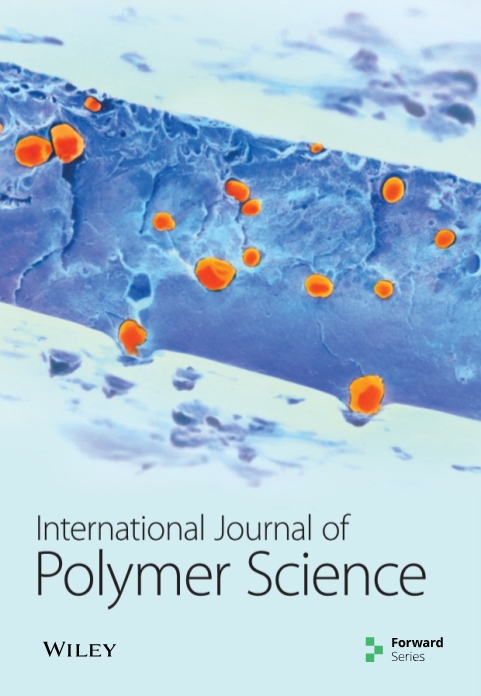生态友好型生物炭作为低密度聚乙烯可持续生物复合材料的低成本固体润滑填料:热学、力学和摩擦学特性分析
IF 4.4
4区 化学
Q2 POLYMER SCIENCE
引用次数: 0
摘要
生物炭是生物质热解过程中产生的富碳副产品,本研究探讨了生物炭作为低密度聚乙烯(LDPE)可持续生物复合材料的低成本固体润滑填料的潜力。拉伸强度、硬度、热重分析 (TGA)、熔融流动指数 (MFI)、拉伸试验、弯曲试验和摩擦试验用于表征生物复合材料的机械、热和摩擦学特性。能量色散 X 射线光谱(EDS)用于评估生物炭的化学成分,而场发射扫描电子显微镜(FESEM)则用于捕捉生物炭的形态。结果表明,在低密度聚乙烯基体中加入生物炭提高了生物复合材料的机械特性,使拉伸强度、弯曲强度和硬度显著增加。更具体地说,LDPE+10 wt% 复合材料的拉伸强度比纯 LDPE 基体高出 1.9%,弯曲强度高出 47%。此外,在低密度聚乙烯复合材料中加入生物炭可提高热稳定性,降低熔体流动指数(MFI),生物炭含量为 10%的复合材料的硬度提高了 24.3%。此外,生物炭还能提高耐磨性和耐用性,LDPE10 复合材料的摩擦系数比纯 LDPE 低 56.3%。这些研究结果表明,生物炭是一种可行、经济、环保的填料,可改善基于低密度聚乙烯的生物复合材料的性能,适用于多种应用领域。本文章由计算机程序翻译,如有差异,请以英文原文为准。
Ecofriendly Biochar as a Low-Cost Solid Lubricating Filler for LDPE Sustainable Biocomposites: Thermal, Mechanical, and Tribological Characterization
The potential of ecofriendly biochar, a carbon-rich byproduct of biomass pyrolysis, as a low-cost solid lubricating filler for low-density polyethylene (LDPE) sustainable biocomposites is investigated in this work. Tensile strength, hardness, thermogravimetric analysis (TGA), melting flow index (MFI), tensile test, flexural test, and frictional tests were used to characterize the biocomposites’ mechanical, thermal, and tribological properties. Energy-dispersive X-ray spectroscopy (EDS) was used to assess the chemical composition of the biochar, while field-emission scanning electron microscopy (FESEM) was used to capture the biochar morphology. The results showed that the incorporation of biochar in LDPE matrix increased the mechanical characteristics of the biocomposites and resulted in a significant increase in tensile strength, flexural strength, and hardness. More specifically, the LDPE+10 wt% composite outperformed the pure LDPE matrix by 1.9% in tensile strength and 47% in flexural strength. Furthermore, integrating biochar into LDPE composites enhances thermal stability, lowers the melt flow index (MFI), and boosts the hardness by 24.3% for the composite with 10% biochar content. Furthermore, biochar improves wear resistance and durability, with the LDPE10 composite exhibiting a friction coefficient that is 56.3% lower than pure LDPE. These findings indicate that biochar is a viable, cost-effective, and environmentally friendly filler for improving the performance of LDPE-based biocomposites for many varieties of applications.
求助全文
通过发布文献求助,成功后即可免费获取论文全文。
去求助
来源期刊

International Journal of Polymer Science
POLYMER SCIENCE-
CiteScore
6.10
自引率
0.00%
发文量
55
审稿时长
>12 weeks
期刊介绍:
The International Journal of Polymer Science is a peer-reviewed, Open Access journal that publishes original research articles as well as review articles on the chemistry and physics of macromolecules.
 求助内容:
求助内容: 应助结果提醒方式:
应助结果提醒方式:


